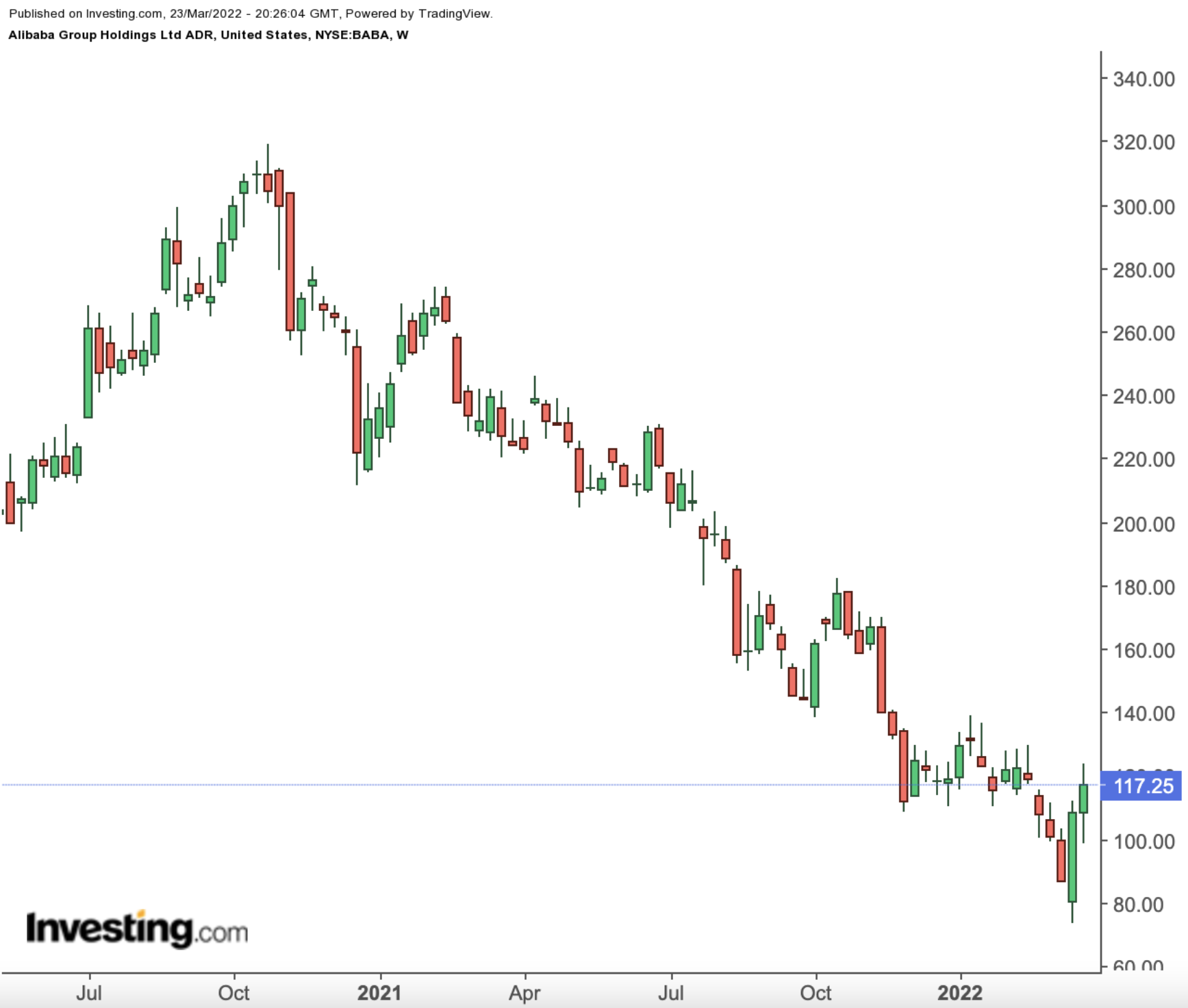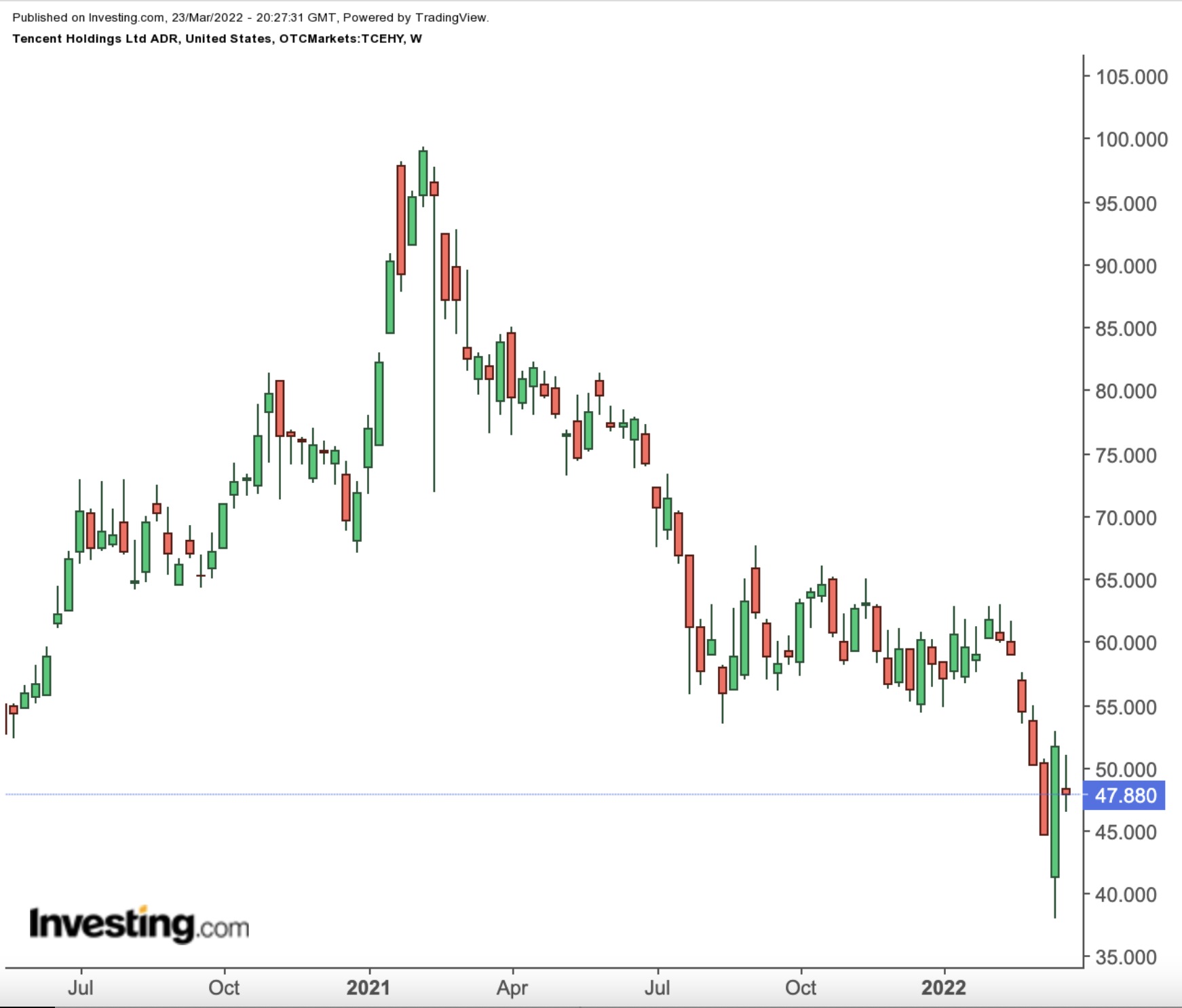Alibaba, Tencent Look Cheap But Should You Buy China's Mega Caps?
Investing.com | Mar 24, 2022 08:26
After taking multiple blows during the past year, Chinese mega cap stocks are beginning to show signs of life again. Last week, the Asian country's top policymaker revealed intentions to stabilize and support its beaten-down capital markets. The announcement triggered an unprecedented daily 33% jump for the NASDAQ Golden Dragon China index of companies listed in the US, its largest advance on record.
The e-commerce giant Alibaba (NYSE:BABA) has rallied an impressive 52.7% since. It closed Wednesday at $117.24.

Similarly, gaming and social media behemoth Tencent (HK:0700) Holdings (OTC:TCEHY) gained 21.4% during the same period. It closed Wednesday at $47.880.

In a series of statements, China's top economic officials reassured investors that a sweeping crackdown on internet companies was nearing its end. Furthermore, the country's banking regulator said it would support insurance companies to increase investment in stock markets, which have been in the grip of intense selling pressure.
However, this government-engineered reversal can't remove the many macroeconomic headwinds that remain in play. One of the biggest is the Russia-Ukraine conflict—in which China, seemingly allied with Russia, appears to be on the wrong side.
China's alleged backing of Moscow in its war with Ukraine is fueling speculations that the world's second largest economy and its companies could face US sanctions if the conflict escalates.
Many investors have begun asking whether Chinese companies are still worth the risk after meeting unprecedented losses on their holdings during the past year.
Rising Geopolitical and Macro Risks
JPMorgan Chase last week downgraded 28 Chinese internet stocks, including Alibaba and Tencent Holdings, calling them "uninvestable" over the next 6 to 12 months due to rising geopolitical and macro risks. Any decision by the US to impose new sanctions on China or individual Chinese firms doing business with Russia is the biggest concern for stock investors.
Another uncertainty that will continue to weigh on these stocks is the push by the SEC to get access to financial data on foreign companies listed on the US exchanges. According to the Wall Street Journal, US regulators could not inspect working papers for five US-listed Chinese companies on Thursday. Among those names are the biotechnology group BeiGene (NASDAQ:BGNE) and Yum China Holdings (NYSE:YUMC), the operator of KFC in China.
The 2020 Holding Foreign Companies Accountable Act enacts a trading prohibition for companies that fail to provide audit papers for three straight years.
Rising Domestic Risks
Even if investors ignore these macro risks, the growth story also doesn't seem too compelling. China's economy is slowing and it's late in the pandemic recovery cycle, with its cities and towns continuing to face lockdowns.
During the last year, China also pursued intense regulatory scrutiny of its technology companies as part of its push to break their monopolies and protect consumer data.
The Asian country has sought to introduce regulation in areas ranging from anti-trust to data protection. After a year of crackdowns, there are signs that these companies are now struggling to grow.
Alibaba told investors last month, during its earnings report, that it will now prioritize user retention over acquisition—a significant shift for a company that became the biggest technology company in China by pursuing relentless growth. Its latest quarterly earnings reported the slowest revenue growth since it went public.
Alibaba's US-listed shares got a boost from its increased share buyback plan, announced this week. Nevertheless, the company lost about half of its value in the past year.
Tencent, which reported its latest quarterly earnings yesterday, showed its slowest pace of quarterly growth on record, hurt by weak online advertising and revenue from gaming.
Tencent has lost more than $470 billion from its peak in 2021, even though it has largely escaped Beijing's direct scrutiny.
Bottom Line
Investing in Chinese stocks remains a risky bet, given the multiple hazards that investors in Chinese companies face. While there are signs that China is willing to ease pressure on its tech giants, it isn't easy to imagine how these companies will manage to show rapid expansions that warrant premium valuations they once enjoyed.
Investors, therefore, are better off staying on the sidelines, in our view.
Trading in financial instruments and/or cryptocurrencies involves high risks including the risk of losing some, or all, of your investment amount, and may not be suitable for all investors. Prices of cryptocurrencies are extremely volatile and may be affected by external factors such as financial, regulatory or political events. Trading on margin increases the financial risks.
Before deciding to trade in financial instrument or cryptocurrencies you should be fully informed of the risks and costs associated with trading the financial markets, carefully consider your investment objectives, level of experience, and risk appetite, and seek professional advice where needed.
Fusion Media would like to remind you that the data contained in this website is not necessarily real-time nor accurate. The data and prices on the website are not necessarily provided by any market or exchange, but may be provided by market makers, and so prices may not be accurate and may differ from the actual price at any given market, meaning prices are indicative and not appropriate for trading purposes. Fusion Media and any provider of the data contained in this website will not accept liability for any loss or damage as a result of your trading, or your reliance on the information contained within this website.
It is prohibited to use, store, reproduce, display, modify, transmit or distribute the data contained in this website without the explicit prior written permission of Fusion Media and/or the data provider. All intellectual property rights are reserved by the providers and/or the exchange providing the data contained in this website.
Fusion Media may be compensated by the advertisers that appear on the website, based on your interaction with the advertisements or advertisers.